
Please Please Me is the debut studio album by the English rock band the Beatles. Produced by George Martin, it was released in the UK on EMI's Parlophone label on 22 March 1963. The album is 14 songs in length, and contains a mixture of cover songs and original material written by the partnership of band members John Lennon and Paul McCartney.
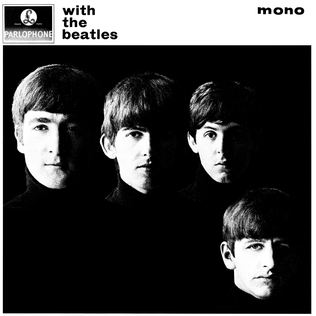
With the Beatles is the second studio album by the English rock band the Beatles. It was released in the United Kingdom on 22 November 1963 on Parlophone, eight months after the band's debut Please Please Me. Produced by George Martin, the album features eight original compositions and six covers. The sessions also yielded the non-album single, "I Want to Hold Your Hand" backed by "This Boy". The cover photograph was taken by the fashion photographer Robert Freeman and has since been mimicked by several music groups. A different cover was used for the Australian release of the album, which the Beatles were displeased with.
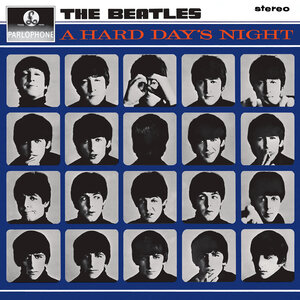
A Hard Day's Night is the third studio album by the English rock band the Beatles, released on 10 July 1964 by Parlophone, with side one containing songs from the soundtrack to their film of the same name. The American version of the album was released two weeks earlier, on 26 June 1964 by United Artists Records, with a different track listing that included selections from George Martin's film score. In contrast to the Beatles' first two albums, all 13 tracks on A Hard Day's Night were written by John Lennon and Paul McCartney, showcasing the development of their songwriting partnership.

Help! is the fifth studio album by the English rock band the Beatles and the soundtrack to their film of the same name. It was released on 6 August 1965. Seven of the fourteen songs, including the singles "Help!" and "Ticket to Ride", appeared in the film and take up the first side of the vinyl album. The second side includes "Yesterday", the most-covered song ever written. The album was met with favourable critical reviews and topped the Australian, German, British and American charts.

Hey Jude is a 1970 collection of non-album singles and B-sides by the Beatles. Originally released in the United States and various other markets, but not in the United Kingdom, it consisted of non-album singles and B-sides not previously issued on an American Beatles LP; this included "I Should Have Known Better" and "Can't Buy Me Love", two singles released by Capitol Records whose only previous American album appearance had been on the A Hard Day's Night soundtrack album, which had been released by United Artists Records. The Hey Jude LP has been out of print since the late 1980s, although it remained available on cassette during the 1990s. The album was issued on CD for the first time in 2014, as an individual release and in a box set titled The U.S. Albums.

"From Me to You" is a song by the English rock band the Beatles that was released in April 1963 as their third single. It was written by Paul McCartney and John Lennon. The song was the Beatles' first number 1 hit on what became the official UK singles chart but the second, after "Please Please Me", on most of the other singles charts published in the UK at the time. "From Me to You" failed to make an impact in the United States at the time of its initial release. Instead, a 1963 cover version released by Del Shannon resulted in the song's becoming the first Lennon–McCartney track to enter the US pop charts. The Beatles' original was rereleased in the US in January 1964 as the B-side to "Please Please Me", and reached number 41.
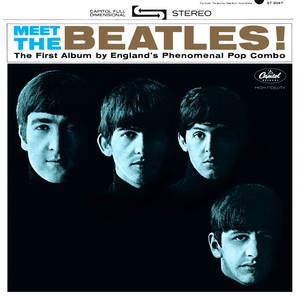
Meet the Beatles! is a studio album by the English rock band the Beatles, released as their second album in the United States. It was the group's first American album to be issued by Capitol Records, on 20 January 1964 in both mono and stereo formats. It topped the popular album chart on 15 February 1964 and remained at number one for eleven weeks before being replaced by The Beatles' Second Album. The cover featured Robert Freeman's iconic portrait of the Beatles used in the United Kingdom for With the Beatles, with a blue tint added to the original stark black-and-white photograph.
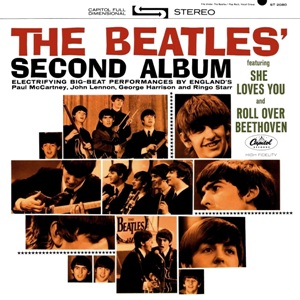
The Beatles' Second Album is the second Capitol Records album by the English rock band the Beatles, and their third album released in the United States including Introducing... The Beatles, which was issued three months earlier by Vee-Jay Records. Following its release in April 1964, The Beatles' Second Album replaced Meet the Beatles! at number 1 on the Billboard Top LPs chart in the US. The album was compiled mostly from leftover tracks from the UK album With the Beatles and Long Tall Sally EP, which are predominantly rock and roll and R&B covers, and rounded out with several Lennon-McCartney-penned non-album b-sides and the hit single "She Loves You". Among critics, it is considered the band's purest rock and roll album and praised for its soulful takes on both contemporary black music hits and original material.

Something New is an album by English rock band the Beatles, released in 1964 for the North American market only.
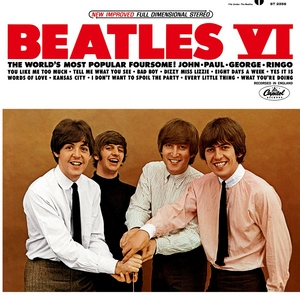
Beatles VI is the seventh Capitol Records studio album by the English rock band the Beatles in the United States and Canada. It was the ninth album released into that market in less than one and a half years. The LP was released in both mono and stereo versions.

Introducing... The Beatles is the first studio album released by the English rock band the Beatles in the United States. Originally scheduled for a July 1963 release, the LP came out on 10 January 1964, on Vee-Jay Records, ten days before Capitol's Meet the Beatles!. The latter album, however, entered the U.S. album chart one week before the former. Consequently, when Meet The Beatles! peaked at No. 1 for eleven consecutive weeks, Introducing...The Beatles stalled at No. 2 where it remained for nine consecutive weeks. It was the subject of much legal wrangling, but ultimately, Vee-Jay was permitted to sell the album until late 1964, by which time it had sold more than 1.3 million copies. On 24 July 2014 the album was certified gold and platinum by the RIAA.

Long Tall Sally is the fifth UK EP release by British rock band the Beatles and the band's first UK EP to include songs not previously released on an album or single in the United Kingdom. It was released by Parlophone in mono, with the catalogue number GEP 8913, and released in the United Kingdom on 19 June 1964. It was also released in Spain and France.

"Thank You Girl" is a song recorded by the English rock band the Beatles, written by John Lennon and Paul McCartney. It was issued as the B-side of the single "From Me to You", which was recorded on the same day. While not released on an LP in the United Kingdom until Rarities in 1978, the song was the second track on The Beatles' Second Album in the United States. As the B-side of the single "Do You Want to Know a Secret", it hit No. 35 on the Billboard Hot 100 in the spring of 1964.

"Please Please Me" is a song released by the English rock band the Beatles. It was their second single in the United Kingdom, and their first in the United States. It is also the title track of their first LP, which was recorded to capitalise on the success of the single. It is a John Lennon composition, although its ultimate form was significantly influenced by producer George Martin.

"If I Fell" is a song by English rock band the Beatles which first appeared in 1964 on the album A Hard Day's Night in the United Kingdom and United States, and on the North American album Something New. It was written primarily by John Lennon and credited to Lennon–McCartney. "That's my first attempt at a ballad proper. ... It shows that I wrote sentimental love ballads way back when", Lennon stated in his 1980 Playboy interview. Paul McCartney stated that he contributed to the song: "We wrote 'If I Fell' together."
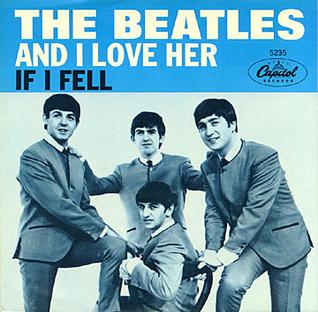
"And I Love Her" is a song recorded by English rock band the Beatles, written primarily by Paul McCartney and credited to the Lennon–McCartney partnership. It is the fifth track of their third UK album A Hard Day's Night and was released 20 July 1964, along with "If I Fell", as a single release by Capitol Records in the United States, reaching No. 12 on the Billboard Hot 100.

"Ask Me Why" is a song by the English rock band the Beatles originally released in the United Kingdom as the B-side of their single "Please Please Me". It was also included on their 1963 debut album Please Please Me. It was written primarily by John Lennon and credited to the Lennon–McCartney partnership.

"Do You Want to Know a Secret" is a song by English rock band the Beatles from their 1963 album Please Please Me, sung by George Harrison. In the United States, it was the first top ten song to feature Harrison as a lead singer, reaching No. 2 on the Billboard chart in 1964 as a single released by Vee-Jay, VJ 587. In the UK, Billy J. Kramer released a cover of the song as his debut single, reaching No. 1 on the NME singles chart and No. 2 on the Record Retailer chart.
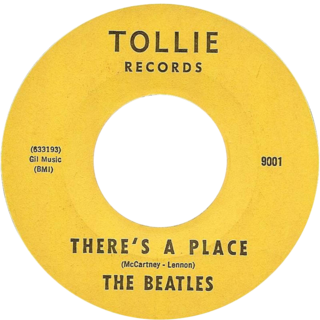
"There's a Place" is a song by the English rock band the Beatles from their debut album, Please Please Me, released in March 1963. It was written primarily by John Lennon and credited to McCartney–Lennon. In the United States, the song was released in July 1963 on the group's first US LP, Introducing... The Beatles, later reissued in January 1964 as Beatlemania surged there. It was also issued as a non-album single in the US, in March 1964, as the B-side to "Twist and Shout", reaching number 74 in the Billboard Hot 100.
Rarities is the name of two separate and unrelated compilation albums by the English rock band the Beatles. The first was released in the United Kingdom in December 1978, while the second album was issued in the United States in March 1980.















